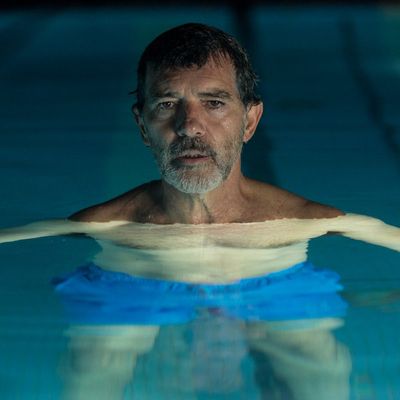
Pain and Glory is at once the gentlest and most emotionally naked movie Pedro Almodóvar has ever made. It’s being billed as an autobiographical work, though that’s more a matter of approach than of actual content. As the aging filmmaker and onetime provocateur Salvador Mallo, Antonio Banderas has been outfitted with Almodóvar’s colorful shirts and high-tops, and he sports a salt-and-pepper beard and a shock of happy hair not unlike the director’s. The character even lives in Almodóvar’s apartment — the production reportedly replicated the filmmaker’s own abode — with its impeccable, vibrant décor, its rainbow curtains and primary-color cabinets and oddball works of art. But then again, most Almodóvar characters have lived in apartments like that; his body of work is rife with surrogates for himself, be they lovesick artists, scorned lovers, or other emotional castaways.
So Salvador isn’t quite Almodóvar, but a fictional alter ego, a vessel through which the director can confess his doubts and regrets and tie up loose ends. Salvador, at times, seems to be a man built entirely out of memories. When we first see him, he’s submerged in a pool, flashing back to his mom (played by Penélope Cruz) washing clothes and singing alongside some other women by a creek. Then, via a captivating animated sequence, Salvador tells us about his many ailments — his migraines, his depression, his twisted vertebrae — and the various methods and medications he uses to control them. This is the pain, presumably. In the same breath, he discusses how his filmmaking career has taken him all over the world and taught him about all the places and countries and towns that he could once only dream about. These are the glories. The question in his mind is how to keep both extremes in line as he grows older, because right now all he’s got, it seems, is pain.
Pain and Glory weaves in and out of the past, through varied forms of expression — paintings, plays, monologues, movies, snatches of literature — in what is sometimes a mazelike narrative. But fundamentally, the picture has two tracks: In the present, Salvador makes amends with an actor (Asier Etxeandia) with whom he once feuded (some have suggested that this references the long period when Almodóvar and Banderas didn’t work together, but I suspect it owes more to the director’s breakup with the great Carmen Maura, the star of titles like Women on the Verge of a Nervous Breakdown and The Law of Desire), and then promptly gets hooked on heroin, a drug he’d always scoffed at. (Almodóvar once said that, as a cocaine person, he hated when his actors did heroin.) Mixing that with his painkillers and generous helpings of alcohol, Salvador drifts further and further into his memories, particularly the period when his impoverished family moved to a small rural town and had to live in a glorified cave. There, mom hires a local illiterate bricklayer (César Vicente) to help fix up their catacomb-like home, in exchange for young Salvador teaching the man to read and write. Of course, young Salvador, in the throes of adolescent sexual awakening, becomes fascinated with the hunky bricklayer for other reasons.
The grown-up Salvador is a man paralyzed both creatively and emotionally — and, given all his aches and pains, he may be in danger of becoming paralyzed physically as well. And yet creation swirls around him. An early film, now regarded as a classic, is given a restoration and screening. (Salvador and his actor are supposed to attend; instead, they get high at home and call in for the Q&A, which ends in comic disaster.) A stray composition about a long-lost lover becomes a monologue that then prompts a remarkable and tender reunion. At one point, Salvador refuses to loan out two pieces of art he owns for a museum show; later, a supposedly anonymous painting drifts back unexpectedly into his life, prompting another cascade of memories, a reminder from the universe that art is meant to be sent out into the world, not kept hidden away.
Throughout, Banderas shifts his understated performance to play the many roles that Salvador finds himself in: He can be a repentant friend one minute, domineering director the next. In a series of scenes with his ailing mother, we see him go from parent to child then back to parent again. It’s a performance of phenomenal range, but it also feels so unified, so controlled. “Better not to be an actor who’s always crying, but one who’s always on the verge of tears,” Salvador advises his actor pal at one point, and it’s the kind of advice one might imagine Almodóvar giving. Melodrama has always been in the director’s bones, but he’s resisted the indulgence that comes with it. We rarely find wild, uncontrolled bursts of emotion in an Almodóvar film (there are a few pointed exceptions); instead, what we get is the spectacle of people struggling to hold things back, while the feelings are displaced onto the décor and the mise-en-scène and the music. Why cry yourself, Almodóvar seems to ask, when this beautiful red pillow can do it for you?
In his later years, as his work has gone from comic farces and ironic thrillers to more subdued dramas and mysteries, Almodóvar has become the cinematic poet of certain kind of eloquent hesitancy. Each work dances on the edge of abject tragedy and emotional devastation, without ever falling in. Pain and Glory takes things one step further. For all its confessional qualities, for all the vulnerability of Banderas’s performance, the film holds it all together, never quite resolving anything — until it gets to its closing image, a simple glance between mother and child that fades out as soon as it registers. And then the tears come, like Noah’s flood.





